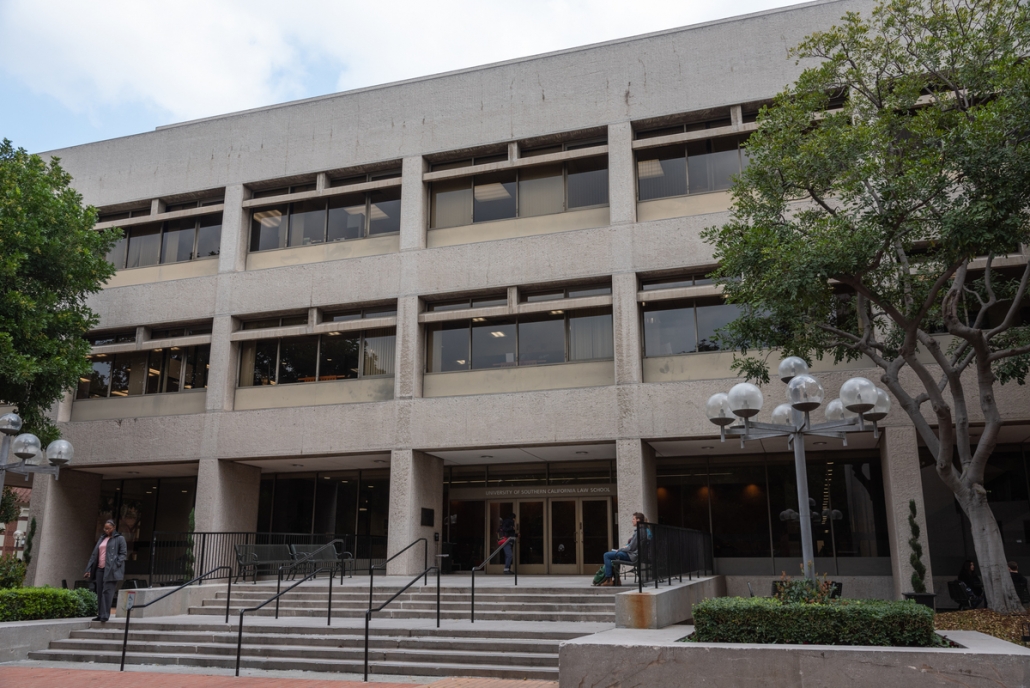USC Gould creates required race course

In response to the Black Lives Matter protests last summer following the deaths of George Floyd and Breonna Taylor, the pandemic disproportionately affecting communities based on their race and economic status, and voter disenfranchisement leading up to the election, Camille Gear Rich wrote a memo proposing a mandatory “Race, Racism and the Law” course at the USC Gould School of Law.
Rich, a Gould professor of Law and Sociology, said she felt students would benefit from a better understanding of historical conversations about race and the law, and an opportunity to consider the contemporary effects of exclusion and marginalization.
“Lawyers have a great deal of responsibility in structuring fair and honest arrangements in society,” Rich said. “When we decline to provide students with an opportunity to talk about race, they can develop a tunnel vision that makes them unable to properly serve their clients and, more broadly, to serve the cause of justice.”
Following phone calls with faculty, more drafts of the memo, and many subcommittee meetings, the course is expected to launch next spring and will be mandatory for all students, beginning with the Class of 2024.
“My colleagues and I believe that the law school has an obligation to do more for our students in terms of preparing them for the legal world, in which they may encounter issues of race and racism that affect their ability to practice law and also affect the lives of their clients,” said Vice Dean for Faculty and Academic Affairs Franita Tolson, one of the chairpersons of the subcommittee that developed the course.
Tolson said that she hopes this course will allow law students to confront issues about race and the law openly. While the law school already offers courses on race such as “Racial Ambiguity Blues” and “Critical Race Theory,” the “Race, Racism and the Law” course is the first to be offered as a requirement for graduation. Additionally, Tolson said the “Race, Racism and the Law” course takes a broader survey approach, as opposed to the specific and specialized courses offered in the past. The course will be offered for the first time in Spring 2022.
“We think it’s important for our students to understand all dimensions of racial issues, as opposed to just a specialized focus offered in some of the courses that we have in our curriculum now,” Tolson said.
According to Tolson, student involvement was key in the creation of this course. Martina Fouquet, a second-year law student and the student representative on the subcommittee tasked with establishing the “Race, Racism and the Law” course, was able to speak with her peers and colleagues and gather a sense of support among the student body.
“A lot of law students can graduate law school with no context whatsoever as to how race and racism affects the application of law,” Fouquet said. “The course is used as a way to ensure that, on top of our doctrinal courses that we are all getting, we are also getting substantive knowledge and understanding of how race and racism affect the application of the law.”
Fouquet said she believes much of the law school curriculum involves courses on passing the bar exam. She hopes the “Race, Racism and the Law” requirement will lead students to apply the law in a way that will lead to adequate addressing of racial issues, regardless of the industry or practice law students go into.
“It’s sometimes unfortunate that while we might be prepared to pass the bar [exam], we might not be fully informed of how to really affect change in our societies, which I think is one of the biggest motivations for people coming to law school,” Fouquet said.
With USC Gould being the first Top 25 law school in the country to implement a requirement of this sort, Rich said she believes the course will attract and inspire students committed to racial justice and fairness and share an understanding of the consequences racism has had for the structure of American democracy.
“We felt that this foundational, cohesive course really provides an opportunity to compare the treatment of different racial groups across time and would really be a signature part of the USC education and a sign of our commitment to intelligently, meaningfully and rigorously discussing topics of race in the years to come,” Rich said.
As a trailblazer on implementing the race and law course requirement, Tolson said she hopes other schools follow suit and that the course normalizes discussions about race as a society.
“I think we have so much potential to do so many great things,” Tolson said. “It reflects well on this University where we are relative to our peers. We’re taking a leading role in this, influencing other schools to follow suit. We’ve heard from a number of other institutions who are also looking at instituting this type of class, and so it feels really, really good to be a trailblazer on this because it’s a really important issue.”

